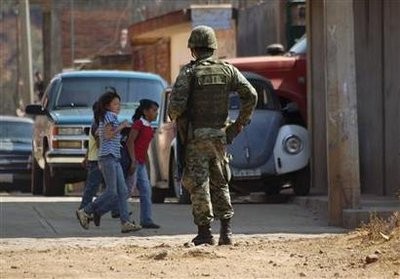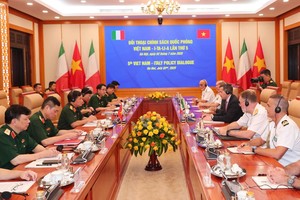A four-year army crackdown in Mexico's methamphetamine-producing heartland has provoked a dizzying increase in violence, fueling fears that the country is losing its battle against organized crime.
Grisly assassinations and gang extortion are terrifying Mexicans in the western state of Michoacan, where President Felipe Calderon launched his war on drug cartels, sending in about 5,000 soldiers in December 2006 following a narrow election victory.
Despite heavily armed patrols, hundreds of drug lab busts and thousands of arrests, locals say gangs in the president's home state wield huge power, ramping up drug output while using terror and bribes to control towns mired in poverty.

Almost 300 people were killed by drug hitmen between January and October in the state, and Michoacan's 2010 total could near the 371 executions seen in 2009, according to Eduardo Guerrero-Gutierrez, an independent drug trade analyst. Total murders jumped to 2,265 last year, compared to 560 in 2006.
"Crime has only gotten worse. Before, things were calm. Now you don't know what could happen," said Miriam Ortiz, a 32-year-old teacher. Sitting by the pink stone cathedral in Michoacan's capital Morelia, near where a drug gang grenade attack killed eight in 2008, she added: "We are afraid here."
The army's arrival on December 11, 2006, in the lush valleys of Michoacan, only a few hours from Mexico City, was hailed by many Mexicans and Washington as a bold departure after decades where drug lords were allowed to control vast fiefdoms in league with dirty politicians.
The military onslaught has been followed by massive troop deployments from Mexico's Caribbean to the U.S. border in a bid to replace corrupt police forces while they undergo reform.
But the traffickers in Michoacan continue to openly defy authorities, despite the added presence of elite police.
Earlier this month, drug hitmen blocked roads with burning cars and set fire to a gas station after security forces arrested two local smugglers, effectively shutting down Morelia. Gunmen fired 1,700 rounds into an armored vehicle carrying the former state police chief in April. The official barely survived and later resigned.
A top state policeman was also gunned down in October. Retired General Manuel Garcia Ruiz, who led Calderon's first charge into Michoacan and took over as Michoacan's police chief this summer, said on Monday he had been threatened.
Meanwhile, Calderon's unprecedented effort to break the ties between officials in Michoacan and traffickers suffered an embarrassing setback this year when judges released 30 local mayors and politicians arrested in 2009 on corruption charges. The judges cited a lack of evidence.
As the bodies pile up -- more than 31,000 across Mexico since December 2006 -- 49 percent of Mexicans say Calderon's drug war is a failure, according to a poll issued last week.
"The traffickers continue to operate and find ways around the authorities. They evolve and develop new alliances, and they survive," said Eric Olson, an organized crime analyst at the U.S.-based Woodrow Wilson Center's Mexico Institute.
Calderon insists there is no turning back, that violence shows gangs are becoming desperate and that he is winning.
"We will persevere until we leave Mexico free of the cancer of organized crime," he said in a speech on Sunday.








)















